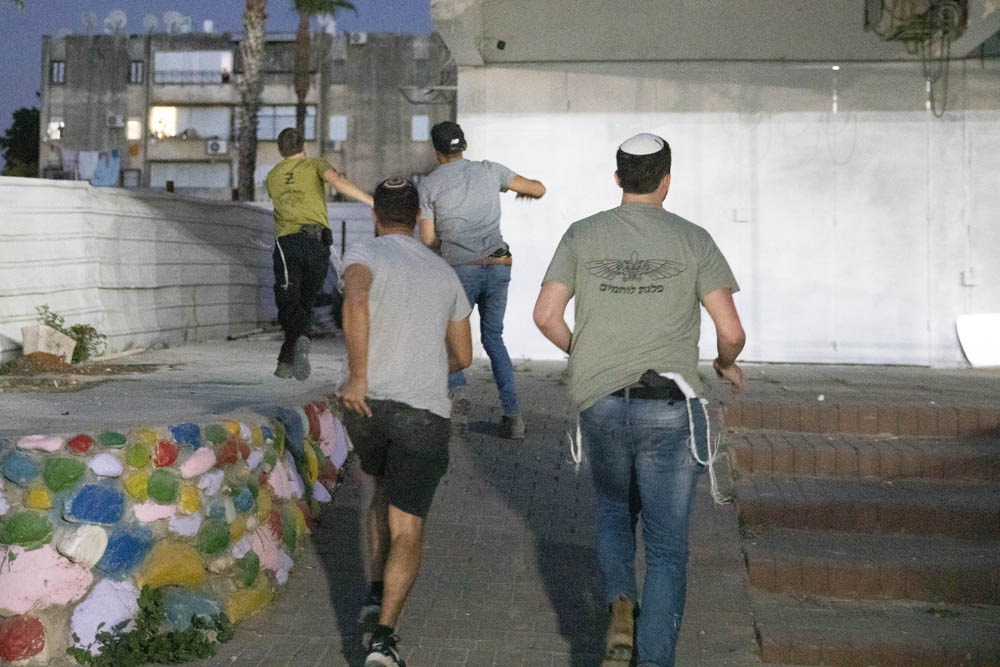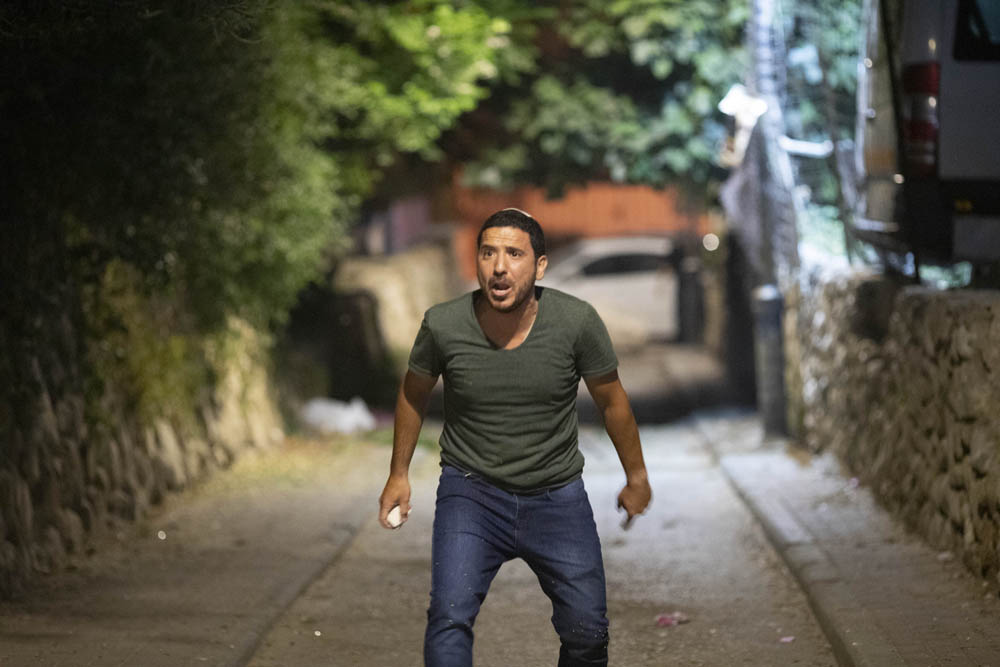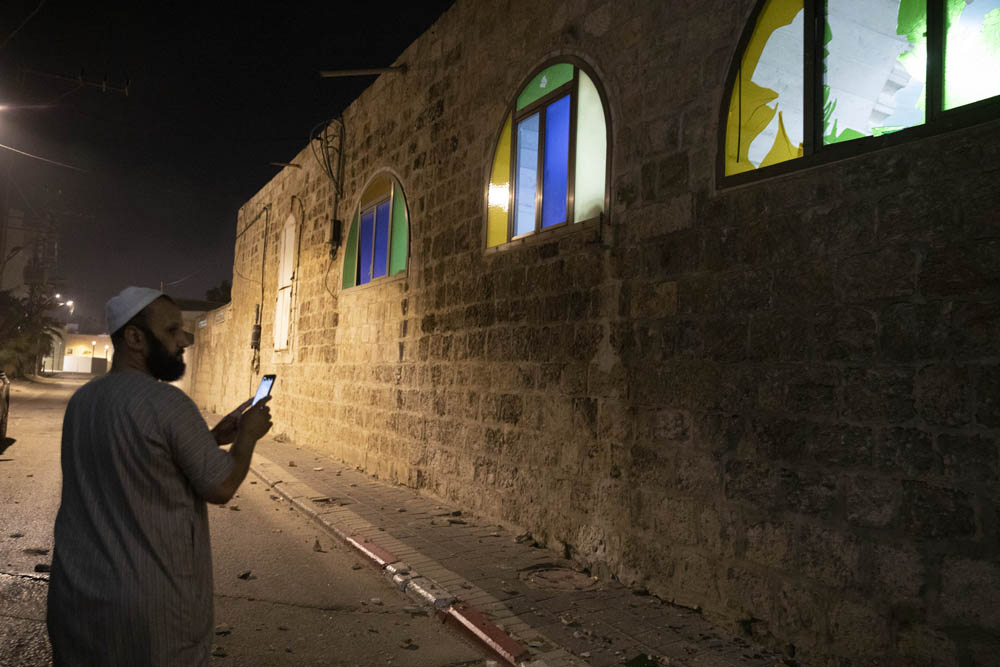How Israeli police are colluding with settlers against Palestinian citizens (original) (raw)
In the city of Lyd in central Israel, Israeli forces are being actively supported by extremist settlers from the occupied West Bank in their attacks on local Palestinians. While Israeli media is portraying the violence in the city — which has included back-and-forth violence between Israeli Jews and Palestinians — as an anti-Jewish pogrom, the reality on the ground tells a different story.
Hours after the city of Lyd was put under a state of emergency Wednesday night, armed West Bank settlers and Jewish right-wingers entered the city and began patrolling the streets while attacking Arab residents with rocks. Israeli police did not stop the attacks, and only in a few cases did they use stun grenades to push the settlers back. The attacks continued with less intensity on Thursday night.
The police began sending forces to the city, which has a large population of both Palestinians and Jews, on Wednesday, in the hours leading up to what was supposed to be a closure on the city. At the same time, hundreds of settlers and rightists began entering the Lyd unimpeded.
The swarming of the city came as Israel’s police chief announced on Wednesday a “state of emergency” and curfew, after Palestinians reportedly set fire to three synagogues, a number of shops, and dozens of cars. The violence took place after confrontations between Palestinian residents and Israeli police following the funeral of an Arab man who was shot on Tuesday night by an Israeli.
With the state of emergency declared, the government immediately sent several Border Police units to the city. On Thursday, Prime Minister Benjamin Netanyahu arrived in the city, where he spoke to a company of Border Police officers and promised that police forces in the city will receive the full backing of the Israeli government. Moreover, he announced that members of the security forces should not be worried about committees of inquiry over their conduct. By Thursday evening, Defense Minister Benny Gantz had extended the state of emergency for another 48 hours after another synagogue in the city was torched.
Netanyahu also said he was considering using administrative detentions against rioters and deploying military troops to quell the violence in mixed Arab-Jewish cities. Israel uses administrative detention to indefinitely detain Palestinians without charge or trial. Administrative detention orders are reviewed every six months, but the detainees are not told what crimes they are accused of, or shown the evidence against them. As a result, it is virtually impossible to defend oneself against an administrative detention order.
Settlers and right-wing activists run through the city of Lyd in central Israel, May 12, 2021. Many of the settlers came from settlements in the occupied West Bank and spent the evening attacking Palestinians in the city under the eye of Israeli security forces. (Oren Ziv)
By Thursday evening, the settlers and activists who came to Lyd could be seen counting down together before storming Arab residential buildings and in some cases setting fire to Palestinian-owned vehicles. In a few instances, police forces tried to stop the attackers but did not make any arrests. Before each countdown, the settlers asked those around them who was carrying a weapon and urged people to “pick up stones.” These were not the youth from the far-right La Familia or Lehava organizations, but rather settlers who have been well trained in confrontations with Palestinians in the occupied West Bank.
In other cases, the settlers and activists threw stones unhindered while standing alongside the police officers, while encouraging the officers to open fire at the Palestinians and telling them they would support the police in entering the Arab neighborhoods. “We came here after seeing days of violence against Jews,” some of them said.
As the sun set, the police arrested several settlers who had entered the city by car, firing into the air as residents approached them. The settlers seemed to be accustomed to dealing with police and soldiers in the occupied territories, as they tried to get up and walk away after the police ordered them to sit down. But unlike what takes place in the West Bank, the police made it clear to them that they were under arrest and did not allow them to leave.
Meanwhile, hundreds gathered around the pre-military preparatory school in Lyd’s Old City, and divided themselves into organized groups, each one led by a “responsible adult.” Many of them carried weapons, while others held stones and poles.
A right-wing Israeli seen during attacks by rightists and settlers on Palestinians in the city of Lyd, central Israel, May 12, 2021. (Oren Ziv)
In one case, police chased a group that fired in the air, but the commander at the scene decided not to detain them, despite the fact that Border Police officers said they had seen settlers shooting in the air. One of the members of the pre-military school told police that these young men were locals, and were therefore moving freely.
Later, a group of around 100 right-wing activists and settlers marched in an organized fashion in the streets, as police shut down entry to the city while soldiers, including from the special SWAT unit, were on patrol. The settlers walked around the city uninterrupted for hours, looking for someone to attack. At one point, they counted to three and barged toward Palestinians while hurling rocks. One young rioter was caught with a Molotov cocktail full of gas, and claimed to police that the bottles were “taken from Arabs.” The police confiscated the bottles, but did not arrest him.
When darkness fell and some Palestinian citizens came out of their homes to confront the rioters, the right-wing activists and settlers began throwing stones at the houses in front of the pre-military academy, as a Border Police officer stood idly by. Like in the occupied territories, the settlers acted as an auxiliary force to police. One of the activists called on a Border Police officer to charge at the compound where a car was set on fire: “Why are you just standing there? Go and shoot them, and we will go in with you,” he told the officer, before charging with several of his friends toward a building where Arab families live.
WATCH: Police stand back as settlers attack Palestinians in Lyd
Close to 9 p.m., the settlers began approaching the large mosque in the center of the city. The muezzin called in Arabic for people to come out and defend the mosque, with hundreds answering the call. While soldiers began dispersing the Palestinian residents with stun grenades, tear gas, and sponge-tipped bullets, right-wing activists took advantage of the situation and charged at the mosque with rocks. Only later were they also dispersed with stun grenades. Even then, they continued to march around the city freely.
At a gas station outside the city, dozens of settlers parked their cars and entered the city by foot without interruption. A worker at the gas station said he saw the settlers leave their cars with crowbars and other weapons.
A Palestinian assess the damage to a mosque in the unrecognized village of Dahmash, near the city of Lyd in central Israel, which was attacked by settlers, May 12, 2021. (Oren Ziv)
Close to 1 a.m., settlers hurled rocks at a mosque in Dahmash, an unrecognized Palestinian village near the Old City. According to the residents who were inside the mosque at the time, the settlers tried to break in while the police stood by. “This is terrorism backed by the state and police,” said one of the residents. “The police were on the other side busy dealing with us. They let [the settlers] do as they please.”
Throughout the evening, occasional live fire could be heard, although it was unclear whether it came from police, settlers, or Palestinian residents. In addition to protecting the main mosque, Arab residents threw stones at the settlers who marched through the street. Palestinians threw a Molotov cocktail at settlers next to a yeshiva, which exploded on the road.
The Palestinian residents who I interviewed on Wednesday repeated what I was told by youth participating in the riots. Their problem isn’t with Jewish people, but with the settlers who have been coming in and taking over the city over the past several years with the mayor’s blessing, they said. “We have been living here for decades with religious and Jewish people, there are good neighborly relations, but they [the settlers] are coming for war,” said one of the Palestinian residents.
WATCH: Border Police, Israeli settlers attack Palestinians in Lyd mosque
Close to midnight, the police succeeded in rounding up many of the right-wing activists at the city’s entrance at Ginton Junction, and the youth from Lyd and the adjacent city of Ramla joined them there. The entire night was marked by a total loss of control. Although hundreds of police officers were deployed to the city, they did not prevent the settlers and right-wing activists from acting as a militia and terrorizing the city.
Yehuda Amrani, the spokesperson for the Mateh Binyamin Regional Council, which governs West Bank settlements, offered the following comment: “Mateh Binyamin embraces and strengthens the Jewish residents of Lod (Lyd’s Hebrew name). Many residents from Mateh Benyamin are showing up in the city with cakes and treats to warm the hearts of the residents there and give them strength, and the council encourages and blesses these acts of solidarity.”
A version of this article was first published in Hebrew on Local Call. Read it here.


